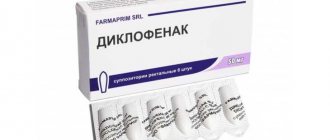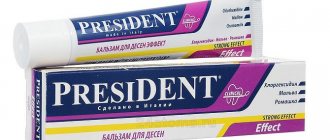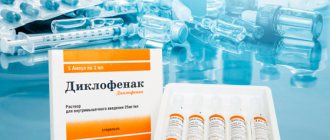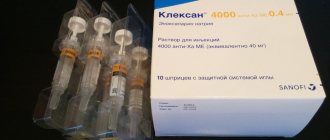The vaginal microflora is so delicate that it often suffers from infectious or inflammatory diseases. They can have different severity, and treatment accordingly may also differ in certain cases.
The drug Ginalgin is effective against many diseases of the female genital area.
When is it used? What adverse reactions may result from therapy? How long does the course of treatment last? - we'll talk in this article.
pharmachologic effect
Vaginal tablets Ginalgin have several effects simultaneously:
- Antibacterial;
- Bactericidal;
- Antifungal;
- Antiprotozoal;
- Trichomonas.
One of the active components of the drug Ginalgin in the form of metronidazole is active against:
- Trichomonas;
- Intestinal lamblia;
- Dysenteric amoeba;
- Bacteroides;
- Fusobacteria;
- Clostridium;
- Peptostreptococci.
Photos of pathogens:
Bacteroides
Fusobacteria
Trichomonas
Intestinal Giardia
Dysenteric amoeba
Peptostreptococci
Clostridia
Metabolism of the substance occurs in the liver. Most of it is excreted through urination.
The second active ingredient is chloroquinaldol.
It cannot be resisted by pathogens in the form of:
- Streptococcus;
- Pseudomonas;
- Shigella;
- Corynebacterium;
- Escherichia coli;
- Dysenteric amoeba;
- Intestinal lamblia;
- Trichomonas.
Local use does not allow large amounts of this substance to enter the systemic circulation.
Citric acid helps normalize the vaginal acid environment if its level has been elevated. This creates optimal conditions for the proliferation of beneficial bacteria.
Pharmacological properties of the drug Ginalgin
A drug for topical use with antifungal, antibacterial and antiprotozoal effects. The effect is due to the combined action of two components - chloroquinaldol and metronidazole. Chlorquinaldol has an antibacterial effect on gram-positive and gram-negative bacteria, antifungal, antiprotozoal and keratoplasty effects. Metronidazole has pronounced antiprotozoal activity, as well as an effect on anaerobic bacteria. When applied topically, it slightly penetrates the mucous membranes.
Composition and release form
The drug Ginalgin is manufactured in the form of vaginal tablets, which are mistakenly called suppositories.
They are sold 10 pieces per pack.
The main active ingredients are contained in certain proportions:
- Metronidazole - 250 mg.
- Chlorquinaldol - 100 mg.
In the production of the drug Ginalgin, additional components are used in the form of :
- Lactose monohydrate;
- Anhydrous citric acid;
- Rice starch;
- Sodium starch glycolate;
- Polyethylene glycol;
- Magnesium stearate.
Vaginal tablets Ginalgin
Instructions for medical use of the drug
Description of pharmacological action
Combined drug for intravaginal use. Metronidazole belongs to the nitro-5-imidazoles. The mechanism of action of metronidazole is the biochemical reduction of the 5-nitro group of metronidazole by intracellular transport proteins of anaerobic microorganisms and protozoa. The reduced 5-nitro group of metronidazole interacts with the DNA of the cell of microorganisms, inhibiting the synthesis of their nucleic acids, which leads to the death of microorganisms. Metronidazole is an effective antimicrobial and antiprotozoal agent with a broad spectrum of action. The drug exhibits high activity against Trichomonas vaginalis, Giardia intestinalis, Entamoeba histolytica, Lamblia intestinalis, as well as against obligate anaerobes (spore-forming and non-spore-forming) - Bacteroides spp. (B. fragilis, B. ovatus, B. distasonis, B. thetaiotaomicron, B. vulgatus), Fusobacterium spp., Clostridium spp., Peptostreptococcus spp., sensitive strains of Eubacterium. Aerobic microorganisms and facultative anaerobes are not sensitive to metronidazole. Chlorquinaldol acts on the following strains of pathogenic bacteria: Corynebacterium diphtheriae, Streptococcus pyogenes, Staphylococcus aureus, Pseudomonas aeruginosa, Proteus vulgaris, Salmonella, Shigella, Escherichia coli. It is also active against protozoa: Entamoeba histolytica, Lamblia intestinalis, Trichomonas vaginalis and some fungi. Citric acid reduces the pH of the vagina, promotes the growth and reproduction of Doderlein rods.
Indications for use
Infectious and inflammatory diseases of the vagina caused by pathogens sensitive to the drug.
Release form
vaginal tablets; blister 5 cardboard pack 2; vaginal tablets; blister 5 cardboard pack 2; Composition Vaginal tablets 1 table. metronidazole 250 mg chloroquinaldol 100 mg excipients: anhydrous citric acid, lactose monohydrate; rice starch; sodium starch glycolate (ultraamylopectin); polyethylene glycol 6000 (Carbowax 6000); magnesium stearate in a blister or contour-free packaging of 5 pcs.; in a cardboard pack there are 2 blisters or 2 packages.
Pharmacodynamics
Combined drug for intravaginal use. Metronidazole belongs to the nitro-5-imidazoles. The mechanism of action of metronidazole is the biochemical reduction of the 5-nitro group of metronidazole by intracellular transport proteins of anaerobic microorganisms and protozoa. The reduced 5-nitro group of metronidazole interacts with the DNA of the cell of microorganisms, inhibiting the synthesis of their nucleic acids, which leads to the death of microorganisms. Metronidazole is an effective antimicrobial and antiprotozoal agent with a broad spectrum of action. The drug exhibits high activity against Trichomonas vaginalis, Giardia intestinalis, Entamoeba histolytica, Lamblia intestinalis, as well as against obligate anaerobes (spore-forming and non-spore-forming) - Bacteroides spp. (B. fragilis, B. ovatus, B. distasonis, B. thetaiotaomicron, B. vulgatus), Fusobacterium spp., Clostridium spp., Peptostreptococcus spp., sensitive strains of Eubacterium. Aerobic microorganisms and facultative anaerobes are not sensitive to metronidazole. Chlorquinaldol acts on the following strains of pathogenic bacteria: Corynebacterium diphtheriae, Streptococcus pyogenes, Staphylococcus aureus, Pseudomonas aeruginosa, Proteus vulgaris, Salmonella, Shigella, Escherichia coli. It is also active against protozoa: Entamoeba histolytica, Lamblia intestinalis, Trichomonas vaginalis and some fungi. Citric acid reduces the pH of the vagina, promotes the growth and reproduction of Doderlein rods.
Pharmacokinetics
When administered intravaginally, metronidazole undergoes systemic absorption. Cmax in the blood after intravaginal use is approximately 50% of the Cmax that is achieved after a single dose of metronidazole orally. Metronidazole is almost completely metabolized in the liver to form inactive derivatives. T1/2 - 8 hours. Metronidazole is excreted mainly in the urine. When administered intravaginally, chlorquinaldol is only slightly absorbed.
Use during pregnancy
Contraindicated during pregnancy. Breastfeeding should be stopped during treatment.
Contraindications for use
Hypersensitivity to metronidazole or other nitroimidazole derivatives; individual intolerance to chlorquinaldol and other ingredients included in vaginal tablets, blood diseases, leukopenia (including a history); impaired coordination of movements, organic lesions of the central nervous system (including epilepsy); liver failure (if large doses are prescribed), pregnancy, breastfeeding.
Side effects
Itching, burning, pain and irritation in the vagina; thick, white, mucous vaginal discharge without odor or with a faint odor, frequent urination; after discontinuation of the drug - development of vaginal candidiasis; burning sensation or irritation of the penis in a sexual partner; headache, dizziness, leukopenia or leukocytosis; nausea, changes in taste, metallic taste in the mouth, dry mouth, decreased appetite, abdominal cramps, vomiting, constipation or diarrhea; allergic reactions: urticaria, itching of the skin, rash. In rare cases, urine may turn red-brown in color due to the presence of a water-soluble pigment formed as a result of the metabolism of metronidazole.
Directions for use and doses
Intravaginally. The tablet is inserted deep into the vagina, preferably in the evening before bedtime, 1 tablet. 1 time per day for 7–10 days. Treatment begins 2–4 days after menstruation. If necessary, a repeat course of treatment is possible.
Interactions with other drugs
Metronidazole enhances the effect of indirect anticoagulants (for example warfarin), which leads to an increase in the time of prothrombin formation. Concomitant use with disulfiram can lead to the development of various neurological symptoms (depression of consciousness, development of mental disorders), therefore Ginalgin should not be prescribed to patients who have taken disulfiram over the past 2 weeks. Cimetidine inhibits the metabolism of metronidazole, which may lead to an increase in its concentration in the blood serum and an increased risk of side effects. When taken simultaneously with lithium preparations, the concentration of the latter in plasma may increase. It is possible that the effect of Ginalgin may be reduced under the influence of barbiturates, because inactivation of metronidazole in the liver accelerates.
Precautions for use
Alcohol intake should be avoided (similar to disulfiram causing alcohol intolerance). During treatment with the drug, it is recommended to abstain from sexual intercourse. If there are indications in the anamnesis of changes in the composition of peripheral blood, as well as when using the drug in high doses and/or with its long-term use, monitoring of a general blood test is necessary. Metronidazole can immobilize treponemes, leading to a false-positive TPI test (Nelson test). Patients, especially drivers of vehicles and persons operating other machinery, should be alerted to the possibility of dizziness associated with taking the drug.
Storage conditions
List B.: In a dry place, at a temperature of 15–25 °C.
Best before date
36 months
ATX classification:
G Genitourinary system and sex hormones
G01 Antiseptics and antimicrobials for the treatment of gynecological diseases
Indications for use
Treatment with Ginalgin is carried out only in the field of gynecology.
Most often, vaginal suppositories are used for thrush.
In addition, the drug is effective against vaginitis of bacterial, trichomonas, fungal and mixed origin.
It is also prescribed as part of complex therapy in case of inflammation of the appendages.
Useful video:
Side effects
Adverse reactions from different body systems may appear due to the use of Ginalgin vaginal tablets.
| No. | Name of organ systems | Adverse drug reactions |
| 1 | Nervous system | Headache Dizziness Atypical sensations in the upper and lower extremities |
| 2 | Mental disorders | Depressive conditions Sleep disorders |
| 3 | Digestive organs | Cramping pain Stomach discomfort Nausea/vomiting Bad taste in the mouth Diarrhea/constipation Flatulence Dry mouth |
| 4 | Genitourinary system | Darkening of urine Itching sensation Burning and irritation in the vagina Feeling of discomfort in the lower abdomen Vaginal discharge Swelling of the vulva Menstrual irregularities Vaginal bleeding Bloody discharge |
| 5 | Skin layer | Itching |
| 6 | Musculoskeletal system | Muscle cramps |
| 7 | General | Fatigue Irritability Loss of appetite |
Causes of development of inflammatory diseases of the vagina
What diseases does Ginalgin help with? Bacterial infection of the vagina (infection with staphylococcus, E. coli, etc.), viral or candida infection of the vaginal mucosa. The inflammatory process develops only when the balance of beneficial and pathogenic bacteria is disturbed. This is only possible if both general and local immunity are significantly weakened. Therefore, in parallel with Ginalgin, gynecologists also prescribe a course of immunomodulatory drugs and vitamin and mineral complexes. You should also pay great attention to your health and give up bad habits.
Factors that lead to the development of inflammatory diseases of the vagina:
- lack of personal hygiene;
- chemotherapy and radiotherapy, as a factor in reducing the body’s immune defense;
- promiscuous sex life;
- wearing tight underwear made of synthetic fabrics;
- chronic fatigue, stress;
- allergic reaction to personal hygiene products, condoms;
- metabolic disease;
- concomitant pathologies of the genitourinary system;
- exacerbation of chronic diseases;
- uncontrolled use of certain medications.
Drug interactions
Ginalgin vaginal tablets should not be combined with alcoholic beverages or medications based on alcohol, iodine, antiseptics or metals.
The interval between the use of vaginal suppositories Ginalgin and disulfiram cannot be less than 14 days
The drug Ginalgin affects the integrity of intrauterine and barrier contraceptives made of latex material.
What determines the duration of therapy?
The duration of treatment is determined by the gynecologist based on the clinical picture. The minimum duration of therapy is six days, the maximum is 10. If you use the drug longer than this period, there is a high risk of developing many side effects.
Reviews from patients who used Ginalgin for longer than the recommended period indicate that after each meal the patients experienced mild nausea, digestion was disturbed, and a skin rash appeared. Of course, not everyone experienced such symptoms, but the frequency of complaints was significantly higher compared to those who used Ginalgin for no more than ten days.
Instructions for use
Typically, the specifics of using medications depend on what diseases they treat.
In the case of Ginalgin vaginal suppositories, the dosage is always the same: 1 piece deep into the vagina immediately before bed.
The duration of treatment cannot last longer than 10 days .
The best time to start therapy is 2 or 4 days after menstrual bleeding; therefore, it is not advisable to use the drug Ginalgin during menstruation.
Storage conditions and shelf life
Candles should be stored in a blister in a dry place at a temperature of 15 to 25 degrees. If the suppository has already been printed, then you should use it as quickly as possible: even a few hours spent outside the blister can negatively affect the therapeutic properties and reduce the severity of the bactericidal and anti-inflammatory effects.
Unopened blisters can be stored for up to three years from the date of manufacture. After this period, the drug should be thrown away, since its use can lead to the development of side effects to an even greater extent than the use of a drug with a normal shelf life.
Analogues substitutes
Vaginal suppositories Ginalgin can be replaced with several similar drugs:
- Candide is available with the addition of clotrimazole in the form of vaginal tablets, cream and solution. Manufacturer: Glenmark Pharmaceuticals Ltd. (India).
- Klion D is made in the form of suppositories with metronidazole and miconazole. (Hungary).
- Neo-Penotran is created with the addition of metronidazole and miconazole in the form of vaginal suppositories. (Türkiye).
- Metromicon is available in the form of vaginal suppositories based on metronidazole and miconazole nitrate. (The Republic of Moldova).
- Flagyl is produced on the basis of metronidazole in the form of tablets and suppositories. Manufacturer: Haupt Pharma Livron (France).
- Ornisid is made on the basis of ornidazole in the form of oral, vaginal tablets. Manufacturer: Abdi Ibrahim Ilac Sanayi ve Ticaret AS (Türkiye).
Photos of analogues:
Neo-Penotran
Metromicon
Ornisis
Klion D
Flagyl
Candide
What is better Candide or Ginalgin?
The drug Candide has clotrimazole as an active ingredient.
It is produced not only in the form of candles, but also in cream, solution, powder
The scope of application is much wider than in the case of vaginal tablets Ginalgin.
Candida is used for skin problems, genital infections, candidal stomatitis and as a sanitation before childbirth.
No less often, women are interested in what is the difference between Ginalgin and Klion D? The second drug in the composition, in addition to metronidazole, also contains miconazole. For this reason, it is more effective against thrush. Klion D is produced in suppositories, which is more convenient to use than vaginal tablets.
special instructions
During the period of use of Ginalgin, it is important to refrain from drinking alcoholic beverages, and also to avoid sexual intercourse.
In cases of using large doses of the drug, as well as in the presence of indications in the anamnesis of changes in the composition of peripheral blood, monitoring of a general blood test is necessary.
If side effects occur during Ginalgin therapy, you must stop the drug and consult a doctor.
Due to the fact that metronidazole, which is part of the drug, can immobilize treponemes, the results of the Nelson test (TPI test) are in most cases false positive.
It is recommended to refrain from driving complex mechanisms and vehicles during Ginalgin therapy.
Patient reviews
Inna, 24 years old : “I used the drug Ginalgin against bacterial vaginosis. There were no adverse reactions and no unpleasant sensations either. Using the tablets did not cause any problems. After a 10-day course I used Vaginorm. So far there has been no relapse of the disease.”
Alina, 28 years old : “In my case, vaginal tablets Ginalgin were ineffective. They only weakened some of the symptoms of thrush, but did not completely eliminate it. I was bothered by headaches for a week, and had to continue treatment with another drug.”









